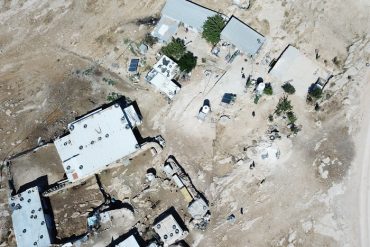1) Those who read the BBC Middle East editor’s online article titled “Is a new Arab Spring unfolding in the Middle East?” this week may have noticed that the sole reference to Iran in Jeremy Bowen’s 705 word analysis was presented as follows:
“But reports also say that men dressed in black, some masked, have been opening fire [on demonstrators in Iraq]. One theory is that they are from pro-Iranian militias.”
The JCPA’s Iran desk documents how “Iraqis Take to the Streets to Oppose Iran’s Involvement in their Country”.
“Iranian media also refrained from reporting the burning of Iranian flags at the Iranian consulate in Karbala. Hundreds of protesters surrounded the consulate building with the cries of “Iran, Get Out, Get Out from Iraq … Baghdad Will Remain Free.” They burned Iranian flags and caused heavy damage to the consulate building. The protesters also trampled on the pictures of Al-Quds force commander Qasem Soleimani (a grave insult in the Arab world). The Iranian consulate building in the port city of Basra was also set ablaze despite attempts by Shi’ite militias to protect it. With cries of “Stop the Persian Occupation of Arab Iraq,” the protestors set ablaze the building.”
2) Also at the JCPA, Dr Jacques Neriah looks at the protests in Lebanon.
“Observers of the Lebanese political scene have been struck by one significant development. Protests are directed for the first time since the Arab spring in 2011 against Hizbullah and its Secretary-General Hassan Nasrallah and against Hizbullah’s ally, the Shiite Amal Movement led by Nabih Berri. Protesters attacked the offices and houses of deputies affiliated to these two political factions, burned posters bearing the pictures of Berri and Nasrallah, and expressed their anger over what the demonstrators perceived as Hizbullah and Amal corruption. Specifically, they claim that the organizations are plundering the coffers of the Lebanese state and skimming the budgets allocated to their ministries, at the expense of the Lebanese people.”
3) Yoram Schweitzer of the INSS analyses the significance of “The Elimination of al-Baghdadi from the Arena”.
“The death of caliph Abu Bakr al-Baghdadi is an important intelligence, operational, and moral achievement for the United States, as well as for its partners in the ongoing international campaign against global terrorist threats. However, the practical significance of this event is less than its symbolic significance. Indeed, the main challenge facing ISIS is far greater than the elimination of its leader, as the organization has struggled in recent months to survive physically and to maintain its position as the dominant organization on the global Salafi-jihadi stage. Thus the elimination of al-Baghdadi from the scene – as important and dramatic as it may seem – is far from heralding the downfall of ISIS or any significant reduction in the dangers posed by the organization, due to the capability attributed to it to recover and to launch terrorist attacks and guerilla warfare in the Levant and beyond.”
4) Jonny Gould sits down with David Collier (alternative links here).
“In this detailed interview profiling his work and background, we get behind the computer screen to reveal more about the man and his mission.
He says his undercover work online has uncovered extraordinary levels of Jew hate at the highest levels of British politics and explains the antizionism he’s encountered as nothing more than antisemitism.
David’s most recent projects have been to lodge a complaint against the publisher, Pearson over a textbook about the Middle East, which he says has been lifted in large part from Wikipedia – and a report into Amnesty, which he believes over obsesses about Israel.
He doesn’t mince his words over the EHRC investigation into the Labour Party either, which he worries will not tell it like it is: that there is a growing alliance between the hard-left and Islamists.”




